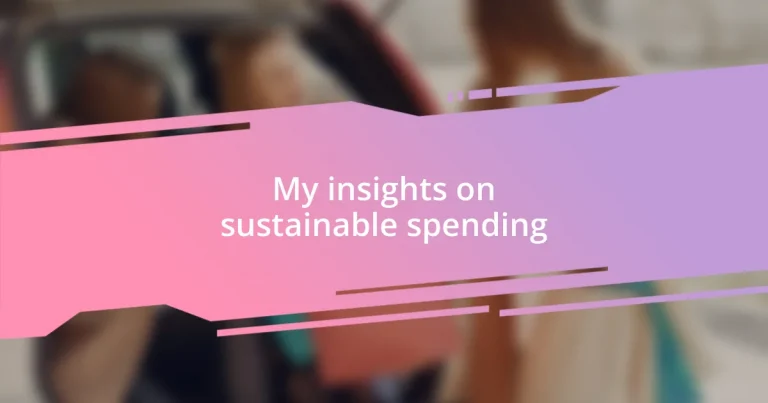Key takeaways:
- Sustainable spending empowers individuals to make conscious choices that benefit both personal finances and the environment.
- Effective budget management is crucial for tracking expenses, enabling informed decisions, and supporting sustainable purchases.
- Choosing ethical products and supporting local businesses fosters community connections and reduces waste, contributing to a healthier planet.
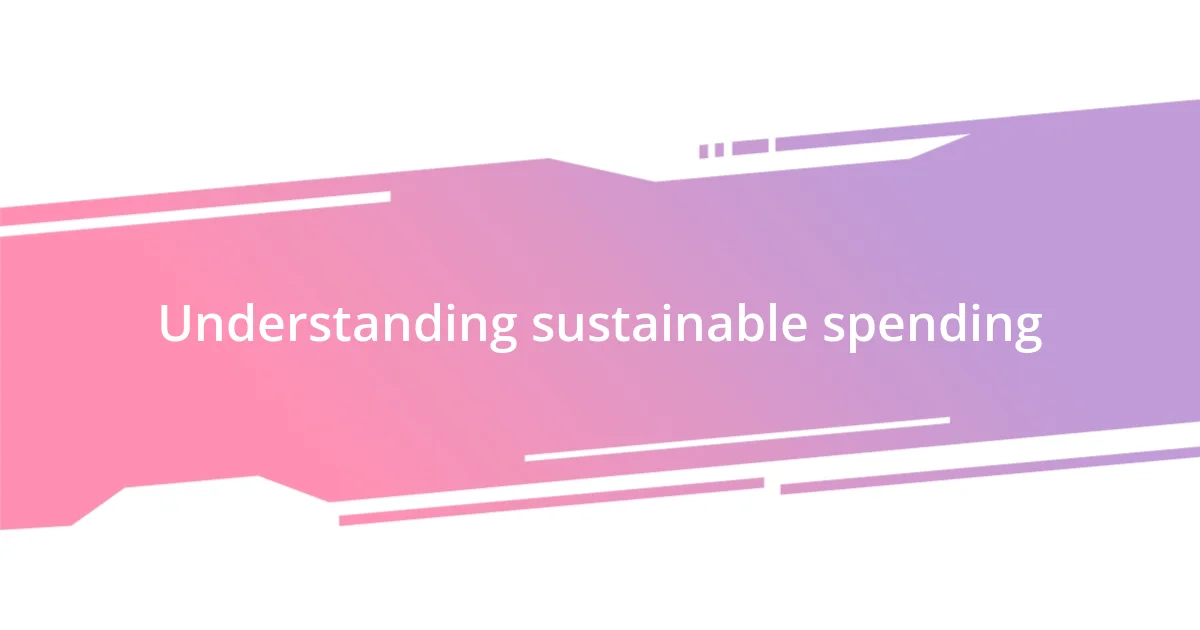
Understanding sustainable spending
Sustainable spending is all about making choices that benefit not just our wallets, but also our planet and society. I remember a time when I bought a well-made, sustainable pair of shoes instead of cheaper, fast-fashion options. That investment not only felt better for the environment, but it also proved to be more cost-effective in the long run since they lasted much longer.
Have you ever stopped to consider the impact of your purchases? For me, it was a revelation when I realized that every dollar I spend holds power. Choosing local products or those that use eco-friendly materials can drastically reduce my carbon footprint and support communities in my area. It’s not just about guilt-free shopping; it’s about embracing the idea that our spending habits can drive change.
Understanding sustainable spending isn’t just a trend; it’s a mindset shift. I recall a moment when I opted for a reusable coffee cup instead of disposable ones. That simple choice led me to think about all the other ways my daily habits could create a ripple effect. It’s fascinating to consider how, by adjusting small aspects of our consumption patterns, we can foster a healthier planet for future generations.
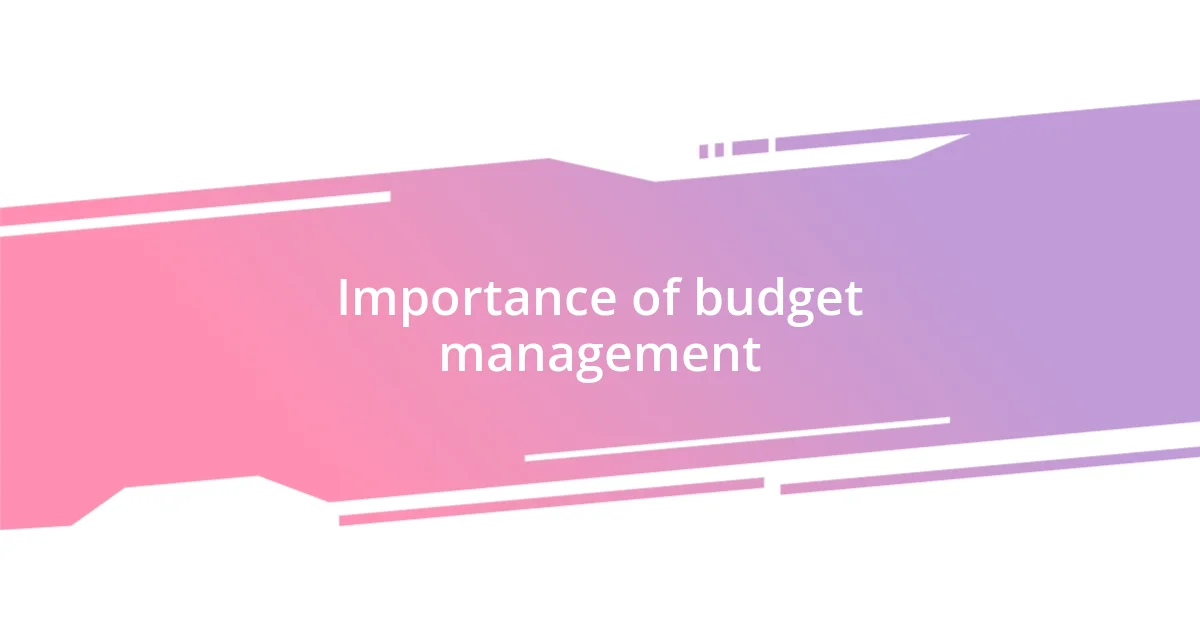
Importance of budget management
Effective budget management is essential for sustainable spending. It allows me to track my expenses and make informed decisions that reflect my values. When I started keeping a budget, it was eye-opening to see where my money went. For instance, I realized I was spending a surprising amount on takeout food. By reallocating that money toward healthier, home-cooked meals, I not only saved money but also improved my well-being.
Here are some key reasons why budget management holds significant importance:
- Awareness: It helps me identify spending habits and areas for improvement.
- Control: I feel empowered knowing I can dictate where my money goes.
- Savings: By budgeting, I can set aside funds for sustainable purchases.
- Long-term goals: It supports planning for future investments, like eco-friendly home upgrades.
- Peace of mind: Managing my budget reduces financial stress and allows me to enjoy my money more.
Taking the time to manage my budget has positively impacted both my finances and my lifestyle choices. Each time I choose to spend consciously, I connect my values with my spending, creating a more fulfilling financial reality.
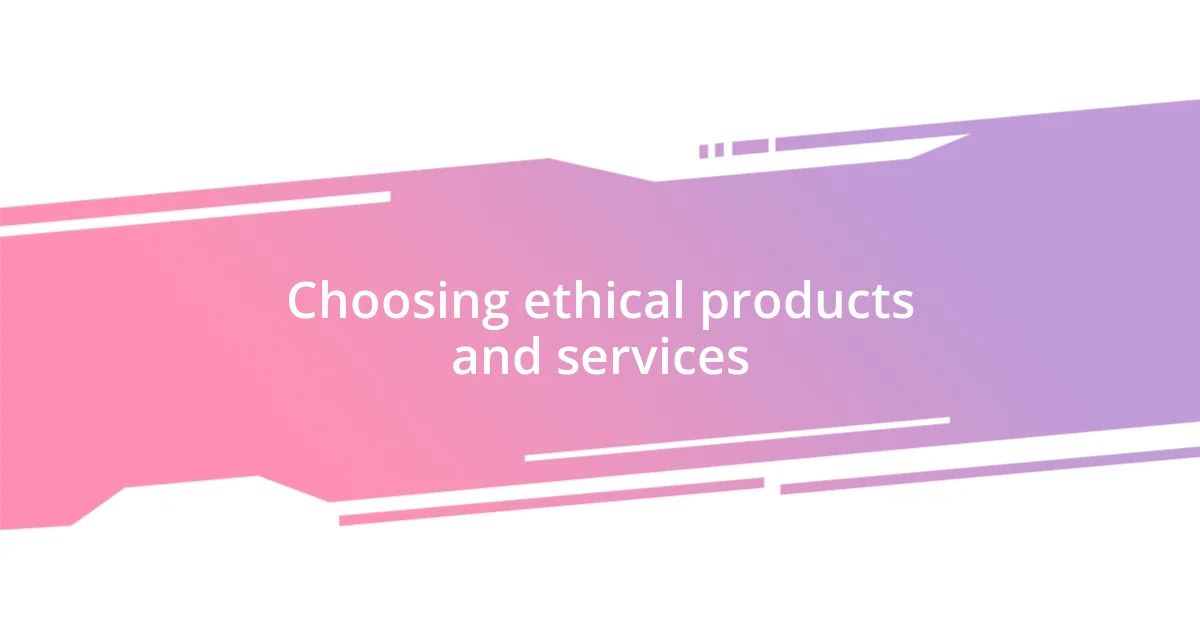
Choosing ethical products and services
Choosing ethical products and services is genuinely transformative for both individuals and communities. I remember when I discovered a local artisan market, filled with handmade goods from the very people in my neighborhood. Making a purchase there felt so different than ordering something online. There’s a unique connection when I know the story behind the product and its maker, which made the item not only more valuable but also rooted in my community.
Navigating through the vast choices of products can be overwhelming, especially with the rise of “greenwashing,” where companies falsely claim to be eco-friendly. I’ve found it helpful to research and ask questions—like how products are sourced and the ethics behind their production. By choosing brands that align with my values, I feel a sense of integrity in my spending, knowing I’m supporting businesses that genuinely prioritize sustainability over profit. It’s a small act that can certainly have a significant impact.
I believe one of the most rewarding aspects of opting for ethical services is witnessing the ripple effect it creates. A few months back, I hired a local contractor who uses reclaimed materials for home renovations. Not only did my project receive a unique touch, but I also loved the idea that my investment supported environmental conservation efforts. Every purchase or service I choose can contribute to a larger purpose, making the act of spending far more fulfilling than it ever felt before.
| Type | Consideration |
|---|---|
| Products | Ethically produced with local ingredients |
| Services | Support small businesses and fair wages |
| Impact | Reduction in carbon footprint and community support |
| Longevity | Quality goods that last longer and reduce waste |
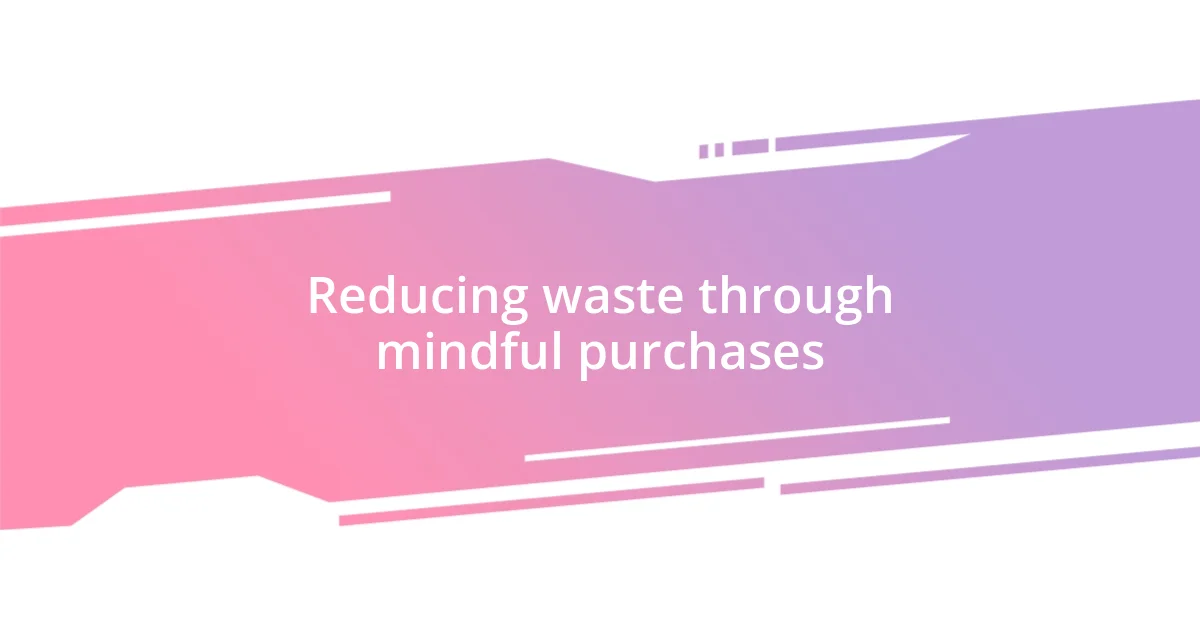
Reducing waste through mindful purchases
Mindful purchases can significantly reduce waste, and it’s something I’ve become increasingly aware of in my own life. I recall a time I was drawn to buy a trendy kitchen gadget that I didn’t really need. After some reflection, I chose to pass on it, thinking about how it would likely end up collecting dust. Instead, I opted to invest in quality, multi-functional tools I genuinely use every day. The satisfaction I felt from making a thoughtful decision, rather than a hasty one, was truly rewarding.
When I shop, I often ask myself, “Will this item serve a real purpose in my life?” This simple question helps me avoid impulse buys that lead to clutter and waste. I remember an instance when I resisted the urge to purchase a fast-fashion outfit. Instead, I waited and saved for a timeless piece from a sustainable brand that fits my style seamlessly. Not only did I feel better about my choice, but I also found that I wore it far more often, proving that mindful spending truly pays off.
I’ve also embraced buying secondhand whenever possible. Recently, I stumbled upon a thrift store treasure—a stunning vintage coat that not only suited my taste but also added character to my wardrobe. By choosing pre-owned items, I’m not only helping to reduce waste but also giving unique items a new lease on life. Each purchase tells a story, and it excites me to think that my spending decisions contribute to a more sustainable cycle. Have you ever found a gem in a thrift store? It’s a thrill that’s hard to replicate.
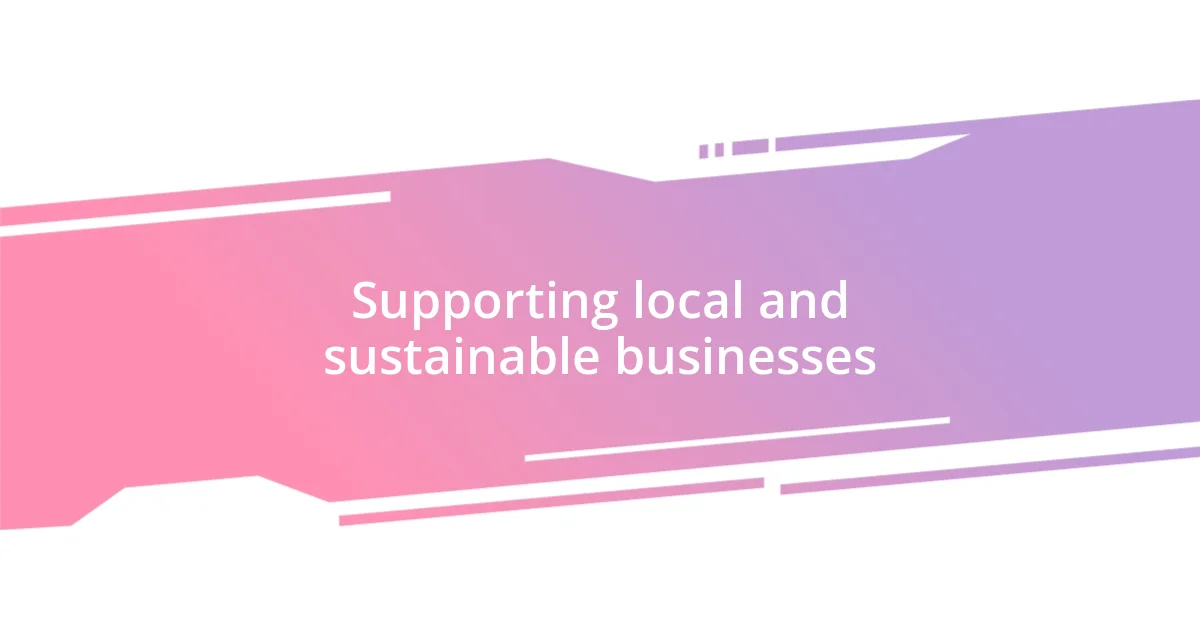
Supporting local and sustainable businesses
Supporting local and sustainable businesses has truly enriched my shopping experience. Just the other week, I visited a small organic grocery store that’s only a few blocks away from my home. It’s amazing how the owner knows her customers by name and can recommend products based on what I love. You can’t beat that level of personalized service, and it feels great knowing my purchases are directly helping someone in my community.
I’ve learned that when I buy from local artisans or sustainable brands, I’m not just purchasing a product; I’m investing in a story and values that resonate with me. I once discovered a small pottery studio nearby that creates beautiful, functional art. Each piece I bought seemed to carry a bit of the artist’s passion with it. And let me tell you, there’s something incredibly satisfying about knowing that my money supports a local craftsperson rather than a faceless corporation.
Navigating the world of sustainable shopping can sometimes feel daunting, but it’s worth it. I often ponder, how does my spending choice impact the environment and my community? Recently, I chose to buy handmade soap from a local maker instead of mass-produced options. Not only was it free from harmful chemicals, but it also supported someone who truly cares about their craft. This shift in mindset has transformed my relationship with shopping—it’s less about consumption and more about connection and consciousness.
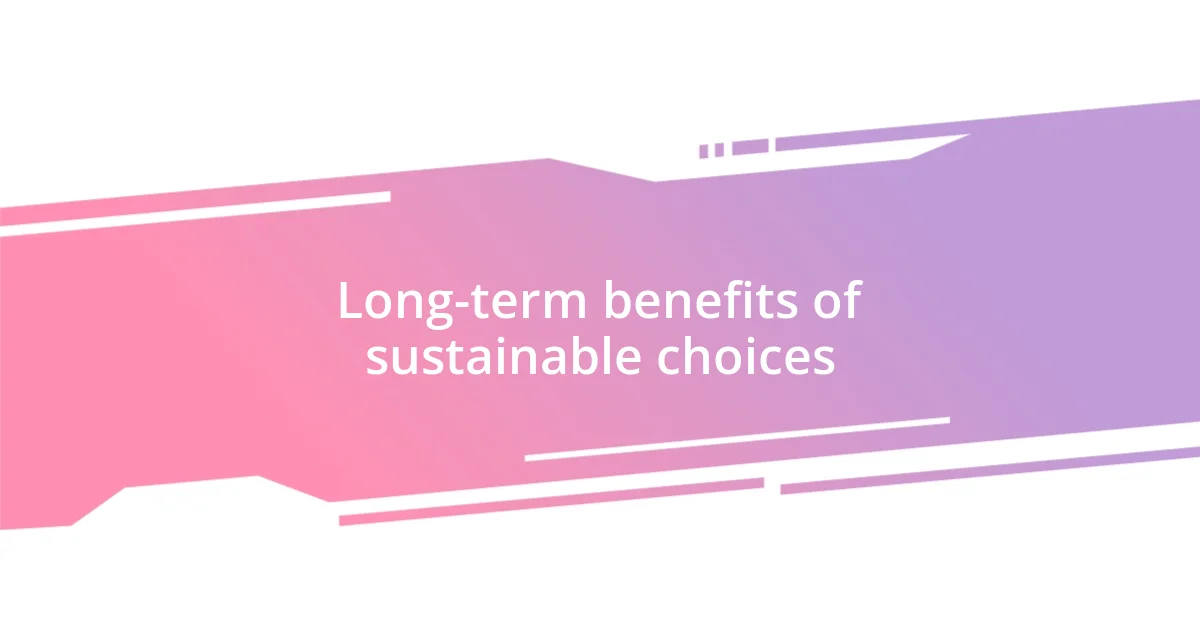
Long-term benefits of sustainable choices
I’ve found that making sustainable choices often leads to unexpected long-term financial benefits. For instance, I decided to invest in a high-quality, energy-efficient appliance instead of opting for a cheaper model. While the upfront cost was higher, I’ve noticed a significant decrease in my utility bills. Have you ever thought about how such choices can pay off in the long run? It can be surprisingly rewarding to realize that sustainable spending isn’t just about ethics; it’s also about practicality.
One thing I appreciate is how sustainable choices contribute to my overall well-being. When I shifted to buying natural products—like organic foods and eco-friendly cleaning supplies—I noticed I felt more energized and healthier. It makes you wonder, doesn’t it? How often do we overlook the profound connection between what we consume and how we feel? The shift was not just about avoiding harmful ingredients; it was about fostering a lifestyle that aligns with my values and contributes positively to my health.
Additionally, I’ve experienced a sense of fulfillment in supporting sustainability-focused initiatives. A while back, I joined a community-supported agriculture (CSA) program. Not only did I get fresh, local produce, but I also developed a deeper connection with the earth and my food sources. Each week, I look forward to the surprise of what’s included in my basket. Seriously, how many times can you say that about grocery shopping? It’s satisfying to know my spending supports sustainable farming practices, creating a healthier planet for future generations.
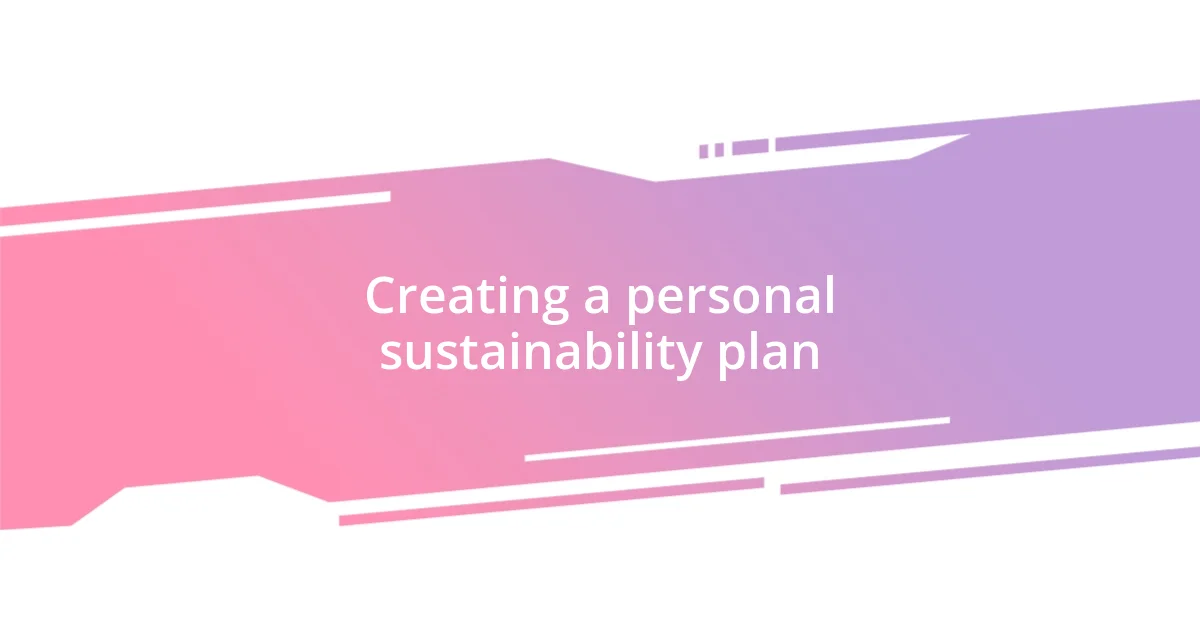
Creating a personal sustainability plan
Creating a personal sustainability plan is about aligning your spending habits with your values. I recently sat down and mapped out my spending patterns. It was surprising to see how much I was spending on items that didn’t reflect my commitment to sustainability. By pinpointing where my money was going, I could redirect it towards eco-friendly brands and initiatives that truly resonated with me.
As I crafted my plan, I also thought about the principles that mattered most to me—like reducing waste and supporting ethical sourcing. I decided to swap out disposable products in my home for reusable ones. This shift not only lessened my environmental impact but also made me feel empowered. Have you ever thought about how small changes to your daily routines can lead to a more sustainable lifestyle? Even the simplest act of carrying a reusable coffee cup can make a significant difference over time.
What’s been eye-opening for me is incorporating goal-setting into my sustainability journey. I set specific targets each month, such as sourcing more of my food from local farmers’ markets or committing to using public transportation instead of my car. Celebrating these small victories fuels my motivation and keeps me engaged. It’s fulfilling to see tangible progress, and I often ask myself, how can I further align my lifestyle with my values? This ongoing evaluation keeps sustainability at the forefront of my decisions, ensuring that my spending reflects my commitment to a better world.












